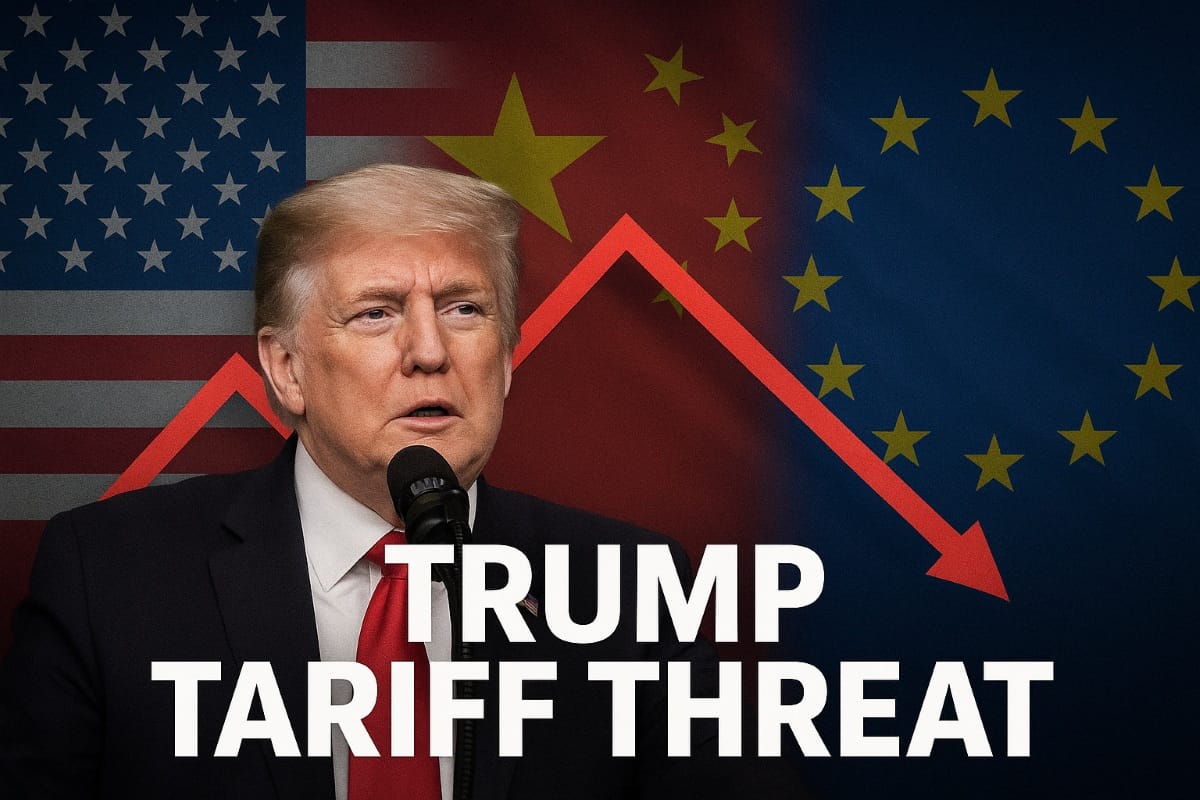GloNews10

The Trump tariff threat is shaking global financial markets as investors fear a full-scale trade war between the U.S., China, and the European Union. Stock markets have tumbled, and analysts warn of major economic disruptions in 2025 if new tariffs are implemented.
Global financial markets are in turmoil after Donald Trump announced sweeping tariffs on imports from China and the European Union. This bold move, aimed at “protecting American jobs,” has rattled investors worldwide, wiping trillions of dollars from stock markets within hours. Economists are calling this one of the most severe trade shocks in recent history — and it’s only the beginning.
Former U.S. President Donald Trump reignited his trade war strategy, proposing a 60% tariff on Chinese goods and a 20% tariff on European imports. The announcement came during a high-profile campaign rally, where Trump vowed to “bring manufacturing back to America.” While this policy may appeal to domestic workers, the global economy is now facing a potential trade war on steroids.
The Dow Jones plunged over 1,000 points, and similar losses were seen in Asian and European markets. The U.S. dollar strengthened temporarily, but commodity prices, including oil and metals, fell sharply.
Tariffs act like a tax on imported goods. While they can protect local industries, they also raise costs for consumers and businesses. In today’s interconnected economy, tariffs lead to:
Economist Paul Krugman warned in an interview with The New York Times that “Trump’s tariff threat could push the world into a recession if global trade contracts significantly.” IMF Warning on Trade Wars
The tariff announcement has already triggered:
Emerging markets such as India, Brazil, and South Africa are also facing currency depreciation as investors rush to safe-haven assets like gold and U.S. Treasury bonds.
The Trump tariff threat has already caused a significant drop in major stock indices worldwide. Wall Street saw a 1,200-point decline in a single day, while European and Asian markets are also bleeding red. Experts say that tariffs on Chinese goods and European cars could cost the global economy billions in lost trade and higher consumer prices.
For American consumers, Trump’s tariff threat means higher prices on electronics, clothing, and cars. For global businesses, it means supply chain chaos and increased costs for raw materials. For investors, it signals a volatile year ahead.
China’s Ministry of Commerce condemned Trump’s tariff plan as “economic aggression” and hinted at countermeasures on U.S. agricultural and technology imports. The EU has also prepared a list of retaliatory tariffs targeting U.S. goods like whiskey, motorcycles, and dairy products. The Guardian Report on Trump’s Tariff Plan
Trump’s first term (2017–2021) saw a prolonged trade war with China, resulting in billions in losses for both economies. However, this new tariff threat in 2025 is far more aggressive, raising concerns about a full-scale global trade war.
Analysts warn that if these tariffs are implemented, the World Bank estimates global GDP could shrink by 1.5% in 2025. The International Monetary Fund (IMF) has urged all parties to avoid escalation, warning that trade wars have no winners.